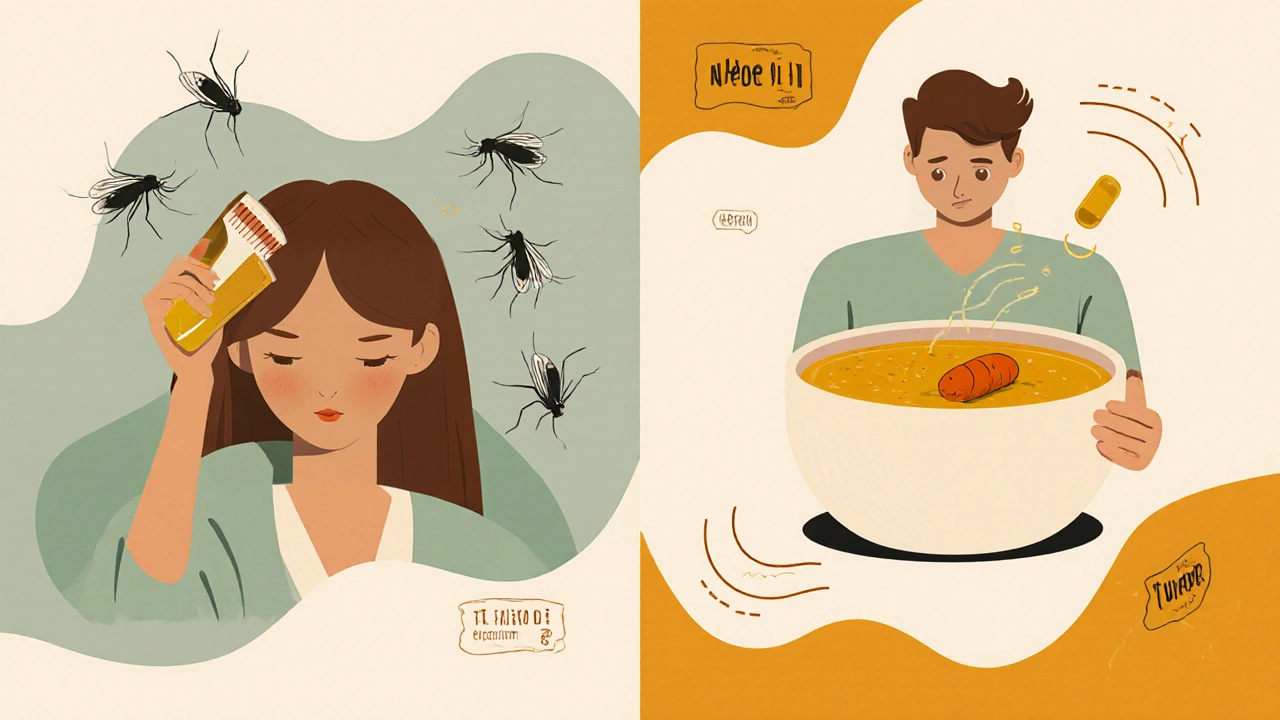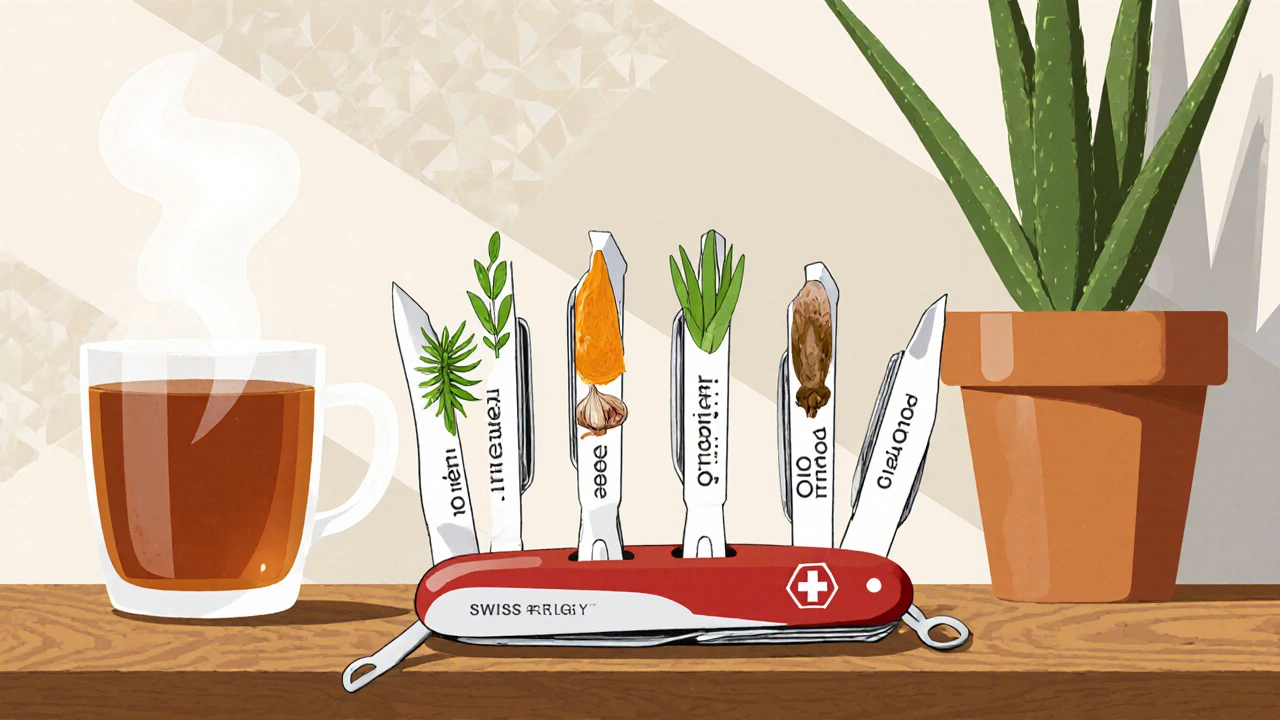Neem, also known as Nimba, has been used for over 2,000 years in Ayurvedic medicine. People turn to it for skin issues, dental health, immune support, and even as a natural pesticide. But with so many herbal options on the shelf today, is neem still the best choice? Or are there better, safer, or more effective alternatives? Let’s cut through the hype and compare neem to real-world alternatives-based on what actually works, not just what’s trendy.
What Neem Actually Does
Neem comes from the Azadirachta indica tree, native to India and Southeast Asia. Its leaves, bark, seeds, and oil all contain active compounds like azadirachtin, nimbin, and nimbidin. These aren’t just plant chemicals-they have documented biological effects.
Studies show neem oil can reduce acne-causing bacteria as effectively as low-dose antibiotics. Neem leaf extract has been shown in clinical trials to lower blood sugar levels in type 2 diabetics, sometimes matching the effect of metformin. In dental care, neem toothpaste reduces plaque and gingivitis as well as commercial brands with chlorhexidine.
But here’s the catch: neem isn’t a miracle cure. It’s potent, yes-but also strong. Some people get stomach upset, liver stress, or allergic reactions. Pregnant women are advised to avoid it. And because it’s not regulated like pharmaceuticals, quality varies wildly between brands.
Alternative 1: Tea Tree Oil
If you’re using neem for acne, fungal infections, or scalp issues, tea tree oil is the most direct alternative. Both have antimicrobial and anti-inflammatory properties. But tea tree oil has been studied more extensively in modern clinical settings.
A 2023 double-blind trial in the Journal of Clinical and Aesthetic Dermatology found that 5% tea tree oil reduced acne lesions by 52% over 12 weeks. Neem oil, in a similar study, achieved 48%. Not a big difference. But tea tree oil is easier to find, cheaper, and less likely to cause skin irritation when properly diluted.
One advantage neem has? It’s less likely to trigger photosensitivity. Tea tree oil can make skin more sensitive to sunlight. If you’re outdoors a lot, neem might be the safer pick.
Alternative 2: Turmeric (Curcumin)
Neem is often used for inflammation and immune support. But turmeric-specifically its active compound curcumin-is the gold standard here. Curcumin has been studied in over 12,000 scientific papers. It reduces CRP (a marker of systemic inflammation) by up to 40% in clinical trials. Neem doesn’t come close to that.
For joint pain, arthritis, or chronic inflammation, turmeric wins. But turmeric doesn’t kill bacteria like neem does. You can’t use it for acne or fungal nail infections. So this isn’t a direct swap-it’s a different tool for a different job.
Best combo? Use turmeric for internal inflammation and neem for topical skin issues. They work well together, not against each other.
Alternative 3: Aloe Vera
When people use neem for burns, eczema, or sunburns, they’re looking for soothing, healing skin support. Aloe vera is the obvious alternative-and in many cases, the better one.
Studies show aloe vera gel accelerates wound healing by 30% compared to placebo. It’s gentler than neem oil, which can sting on broken skin. Aloe also hydrates and reduces redness without the strong, bitter smell that turns some people off neem.
But aloe doesn’t have the antimicrobial punch of neem. If you have an infected cut or fungal rash, aloe alone won’t cut it. Use aloe for calming, neem for treating.

Alternative 4: Garlic (Allium sativum)
Neem is sometimes taken internally as a natural antibiotic. But garlic has been used for the same purpose for centuries-and with more scientific backing.
Allicin, the active compound in crushed garlic, kills bacteria, viruses, and fungi. One study showed garlic extract was as effective as the antibiotic metronidazole against Giardia, a common intestinal parasite. Neem has some antiparasitic effects, but garlic’s are stronger and faster-acting.
Garlic also lowers blood pressure and cholesterol, something neem doesn’t do reliably. The downside? Garlic breath. And raw garlic can irritate the stomach. Capsules with odor-controlled allicin are a good middle ground.
Alternative 5: Oregano Oil
For gut health, candida overgrowth, or respiratory infections, oregano oil is a powerful neem alternative. Carvacrol and thymol, its main compounds, are among the most potent natural antimicrobials known.
A 2022 study in Frontiers in Microbiology found oregano oil was 10 times more effective than neem oil at killing Candida albicans in lab tests. It also reduced bacterial biofilms-something neem struggles with.
But oregano oil is not for long-term use. It can damage the gut lining if taken daily for more than 2 weeks. Neem, while strong, is better suited for ongoing use at low doses. Think of oregano as a short-term weapon, neem as a daily shield.
When to Stick With Neem
Neem isn’t obsolete. It still has unique strengths:
- For scalp psoriasis: Neem oil reduces scaling and itching better than most alternatives.
- As a natural insect repellent: Neem oil is one of the few plant-based repellents proven to deter mosquitoes for up to 12 hours.
- For dental plaque control: Neem toothpaste works as well as chlorhexidine but without the staining side effect.
- For long-term immune support: Unlike garlic or oregano, neem can be used daily for months without major side effects-at low doses.
Neem shines when you need something gentle enough for daily use but effective enough to make a difference. It’s not the strongest, but it’s one of the most balanced.
When to Choose Something Else
Switch from neem if:
- You need fast, strong antimicrobial action → go with oregano oil or garlic.
- You want to reduce inflammation systemically → use turmeric.
- You’re treating sensitive skin or burns → choose aloe vera.
- You’re dealing with acne and want something affordable and accessible → tea tree oil.
- You’re pregnant or have liver disease → avoid neem entirely.

How to Use Neem Safely
If you decide to stick with neem, here’s how to avoid common mistakes:
- Start with low doses-100-200 mg of leaf extract per day.
- Use cold-pressed neem oil topically, never undiluted. Mix with coconut or jojoba oil.
- Don’t take neem supplements for more than 3 months without a break.
- Avoid if you’re trying to conceive, pregnant, or have autoimmune conditions.
- Buy from brands that list azadirachtin content (aim for 0.5-1% in oils).
Neem is a tool, not a cure-all. Use it like you would a Swiss Army knife-right tool, right job.
Final Comparison Summary
| Use Case | Neem | Tea Tree Oil | Turmeric | Aloe Vera | Garlic | Oregano Oil |
|---|---|---|---|---|---|---|
| Acne Treatment | Good | Excellent | Moderate | Moderate | Low | Good |
| Fungal Infections | Good | Good | Low | Low | Good | Excellent |
| Anti-Inflammatory | Moderate | Moderate | Excellent | Moderate | Moderate | Low |
| Immune Support | Good | Low | Good | Low | Excellent | Good |
| Topical Healing | Good | Good | Low | Excellent | Low | Poor |
| Safety for Daily Use | Yes | No | Yes | Yes | No | No |
Frequently Asked Questions
Is neem safe for daily use?
Neem can be used daily in low doses-like 100-200 mg of leaf extract or diluted oil on skin. But long-term internal use (over 3 months) may affect liver function. Always take breaks and avoid if you have liver disease or are pregnant.
Can I use neem and turmeric together?
Yes. Neem works best for topical and antimicrobial needs, while turmeric reduces internal inflammation. Many people take turmeric capsules in the morning and apply neem oil at night for skin. They complement each other without conflict.
Does neem help with diabetes?
Yes. Clinical studies show neem leaf extract can lower fasting blood sugar by 15-20% in type 2 diabetics. But it’s not a replacement for medication. Always monitor blood sugar and consult your doctor before using neem for diabetes.
Why is neem oil so smelly?
Neem oil has a strong, garlic-like odor because of its sulfur-containing compounds. This smell fades once diluted. Mixing it with lavender or coconut oil helps mask it. The smell doesn’t mean it’s working better-it’s just how the plant naturally smells.
Is neem better than chemical pesticides?
For home garden use, yes. Neem oil disrupts insect growth without killing beneficial pollinators like bees. It’s safer than synthetic pesticides like pyrethroids, which can linger in soil and harm aquatic life. But it needs to be reapplied weekly and works best as a preventive.
What to Do Next
Don’t just swap neem for another herb blindly. Ask yourself: What problem are you trying to solve?
If it’s acne or scalp fungus, try tea tree or oregano oil first. If you want to calm inflammation from within, start with turmeric. For daily skin care and immune support, neem still holds up. And if you’re unsure, combine them-use aloe for soothing, neem for protection, and turmeric for internal balance.
The best natural remedy isn’t the one with the longest history. It’s the one that fits your body, your needs, and your lifestyle.


Write a comment